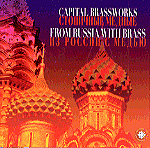If you’re a brass ensemble enthusiast you won’t be surprised by the repertoire on this program–works such as Khachaturian’s Sabre Dance, selections from Tchaikovsky’s Nutcracker, and Mussorgsky’s Pictures at an Exhibition have been done before, although the arrangements here are by Capital BrassWorks trombonists Angus Armstrong and Colin Traquair. And although there’s nothing fundamentally wrong with doing or re-doing some favorites, we’d hope at least to hear something in the sound, the style, or expressive/interpretive approach that makes us excited, compelled to keep listening. Unfortunately, these dozen or so players–all highly accomplished musicians drawn from Ottawa’s professional orchestras–play far too straight and square to generate more than a good impression.
Right from the opening of the first track, the Sabre Dance, the percussion takes a too-dominant role and remains front and center along with the lower-register instruments pumping away on the beat, while the melody that should be commanding our attention lacks punch, suffering from weak accents and chromatic riffs that demand more audacity. The Nutcracker selections are pleasing to listen to, but again, the colors are plain, the sense of fantasy and exoticism in pieces such as the “Arabian Dance” is barely there. It may be the arrangements, and it may be just a function of the brass timbres–but it’s also due to a reserved character in the playing that seems at odds with the style of most of the brass players I’ve ever known!
The program concludes with Colin Traquair’s arrangement of Mussorgsky’s Pictures. All the expressive flaws mentioned above apply here as well, the square, sparkless internal rhythms (listen to “The Old Castle”, for instance) creating a characterless, benign mood. Rather than enhance the texture and dynamic power of the ensemble, the organ’s timbres prove not very complementary; it’s big moment in “The Great Gate of Kiev” projects a big wall of sound, but it’s one that obstructs more than reinforces. When the brass play alone at the final section’s opening, the expected fullness of those big blocks of chords is disappointingly anemic.
Although it may be slightly unfair to compare this larger ensemble with a much smaller one, I use as my model for brass groups–for style, for technique, for musicality, for sheer charisma, and for the high quality and suitability of the arrangements–another Canadian group, the Canadian Brass. If you want to hear exciting, virtuosic, consummately entertaining brass music, listen to them–whether it’s the Sabre Dance, Barber’s Adagio for Strings, Rimsky-Korsakov’s Flight of the Bumblebee, or an insanely difficult Rossini aria, these players have the energy, attitude, and confidence to make trumpets and trombone and horn and tuba irresistible even for a listener who thought he wasn’t going to like it. On their own, without comparison to other groups, these performances make an okay effort that even rises to excellence in selections such as Rachmaninov’s Vocalise, where cornet soloist Karen Donnelly really draws us in with her beautiful tone and lovely legatos. But for playing that will make you want to come back for more, look elsewhere. [Note: My CD copy suffered a major glitch toward the end of the last track, so the final 90 seconds were unplayable–on any of my CD players.]
































